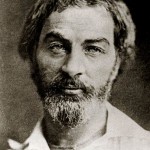
John Dyer, of whom I have no other account to give than his own letters, published with Hughes’s correspondence, and the notes added by the editor, have afforded me, was born in 1700, the second son of Robert Dyer of Aberglasney, in Caermarthenshire, a solicitor of great capacity and note. He passed through Westminster school under the care of Dr. Freind, and was then called home to be instructed in his father’s profession. But his father died soon, and he took no delight in the study of the law; but, having always amused himself with drawing, resolved to turn painter, and became pupil to Mr. Richardson, an artist then of high reputation, but now better known by his books than by his pictures. Having studied a while under his master, he became, as he tells his friend, an itinerant painter, and wandered about South Wales and the parts adjacent; but he mingled poetry with painting, and about 1727 (1726) printed “Grongar Hill” in Lewis’s Miscellany. Being, probably, unsatisfied with his own proficiency, he, like other painters, travelled to Italy; and coming back in 1740, published the “Ruins of Rome.” If his poem was written soon after his return, he did not make use of his acquisitions in painting, whatever they might be; for decline of health and love of study determined him to the Church. He therefore entered into orders; and, it seems, married about the same time a lady of the name of Ensor; “whose grandmother,” says he, “was a Shakspeare, descended from a brother of everybody’s Shakspeare;” by her, in 1756, he had a son and three daughters living.
His ecclesiastical provision was for a long time but slender. His first patron, Mr. Harper, gave him, in 1741, Calthorp in Leicestershire, of eighty pounds a year, on which he lived ten years, and then exchanged it for Belchford, in Lincolnshire, of seventy-five. His condition now began to mend. In 1751 Sir John Heathcote gave him Coningsby, of one hundred and forty pounds a year; and in 1755 the Chancellor added Kirkby, of one hundred and ten. He complains that the repair of the house at Coningsby, and other expenses, took away the profit. In 1757 he published “The Fleece,” his greatest poetical work; of which I will not suppress a ludicrous story. Dodsley the bookseller was one day mentioning it to a critical visitor, with more expectation of success than the other could easily admit. In the conversation the author’s age was asked; and being represented as advanced in life, “He will,” said the critic, “be buried in woollen.” He did not indeed long survive that publication, nor long enjoy the increase of his preferments, for in 1758 he died.
Dyer is not a poet of bulk or dignity sufficient to require an elaborate criticism. “Grongar Hill” is the happiest of his productions: it is not indeed very accurately written; but the scenes which it displays are so pleasing, the images which they raise are so welcome to the mind, and the reflections of the writer so consonant to the general sense or experience of mankind, that when it is once read, it will be read again. The idea of the “Ruins of Rome” strikes more, but pleases less, and the title raises greater expectation than the performance gratifies. Some passages, however, are conceived with the mind of a poet; as when, in the neighbourhood of dilapidating edifices, he says,
"The Pilgrim oft
At dead of night, 'mid his orison hears
Aghast the voice of Time, disparting tow'rs
Tumbling all precipitate down dashed,
Rattling around, loud thund'ring to the Moon."
Of “The Fleece,” which never became popular, and is now universally neglected, I can say little that is likely to recall it to attention. The woolcomber and the poet appear to me such discordant natures, that an attempt to bring them together is to COUPLE THE SERPENT WITH THE FOWL. When Dyer, whose mind was not unpoetical, has done his utmost, by interesting his reader in our native commodity by interspersing rural imagery, and incidental digressions, by clothing small images in great words, and by all the writer’s arts of delusion, the meanness naturally adhering, and the irreverence habitually annexed to trade and manufacture, sink him under insuperable oppression; and the disgust which blank verse, encumbering and encumbered, superadds to an unpleasing subject, soon repels the reader, however willing to be pleased.
Let me, however, honestly report whatever may counterbalance this weight of censure. I have been told that Akenside, who, upon a poetical question, has a right to be heard, said, “That he would regulate his opinion of the reigning taste by the fate of Dyer’s ‘Fleece;’ for, if that were ill-received, he should not think it any longer reasonable to expect fame from excellence.”
- 100 Screenwriting Ideas to Get You Writing - January 20, 2026
- 100 Winter Storm Writing Prompts - January 17, 2026
- 100 Haunted House Story Starters: Craft Your Scariest Tale Yet - January 10, 2026



